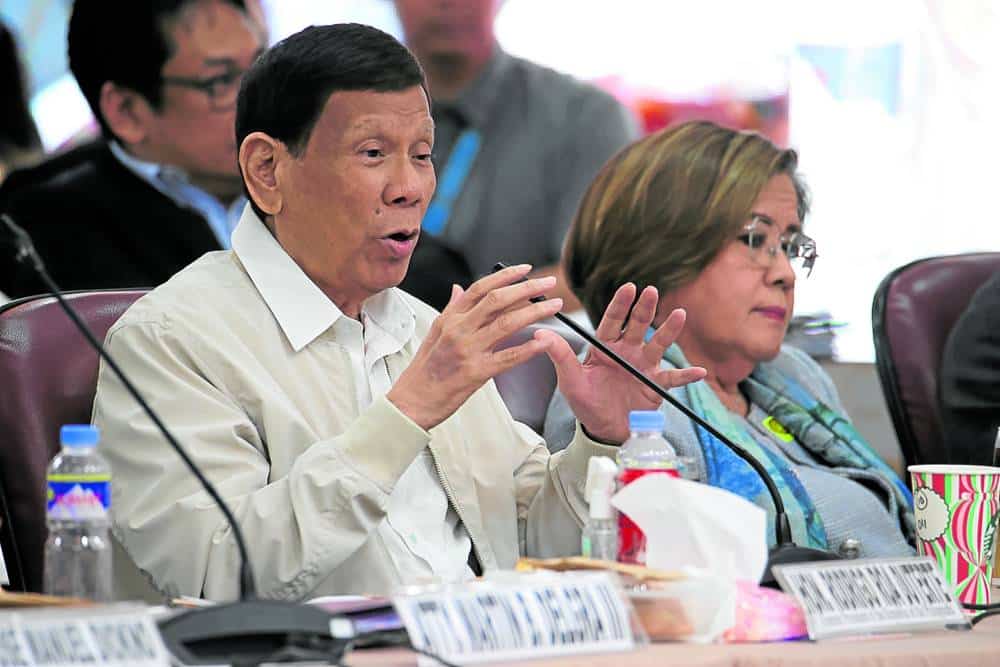
Former president Rodrigo Roa Duterte attends the House of Representatives Committees on Dangerous Drugs, Public Order & Safety, Human Rights and Public Accounts Joint Committee Meeting on Wednesday, November 13, 2024 at People’s Center Building, House of Representatives, Quezon City. (INQUIRER PHOTO / NIÑO JESUS ORBETA)
MANILA, Philippines — The House of Representatives’ quad committee should start checking on other human rights violations supposedly perpetrated during the past administration, Bagong Alyansang Makabayan (Bayan) president Renato Reyes Jr. said on Friday.
Reyes, in a statement, said that the quad committee investigation must look beyond claims of rights violations in the drug war, as this template was also used to harass and kill activists who were critical of former president Rodrigo Duterte.
“It is time for the quad comm to look into the far-reaching human rights implications of the bloody drug war. The ‘war on drugs’ is the template used for killing hundreds of activists. In the drug war, a list is used to ‘identify’ or label drug dealers and traders, which is then used to justify their killings,” Reyes said.
“In the war against dissent, red-tagging is used to accuse activists of illegal acts, which then justifies extrajudicial killings, arrest warrants, and trumped-up charges,” he added.
Reyes further said that Duterte’s statements before the quad committee and Senate blue ribbon committee hearings — that suspects can be killed if they are presumed as criminals — is a major concern to the protection of human rights and the pursuit of the rule of law.
According to Reyes, the same concept was used in the killing of activists when Duterte was in office from July 2016 to June 2022.
“The biggest danger to the rule of law and human rights articulated by former president Duterte during the quad comm hearings is the idea that ‘justice’ can be meted out if one is presumed to be a criminal. He has repeatedly said during past hearings that it is okay to kill criminals, so much so that police should encourage them to fight to justify killing them,” he said.
“It is the same mindset that has led to the killings and arrests of hundreds of activists during the term of Duterte. Activists are labeled as ‘communists’ and ‘terrorists,’ which is then used to target them with arrests or killings,” he added.
In August 2020, the Commission on Human Rights (CHR) pointed out that 89 human rights defenders were killed from 2017 to 2019 — including the assassination of Zara Alvarez, rights group Karapatan’s former education director, and National Democratic Front of the Philippines peace consultant Randall Echanis.
Echanis’ death in August 2020 sent shockwaves across the human rights defenders’ community as the former peace consultant was killed inside his rented house in Novaliches, Quezon City, even as movement of the COVID-19 pandemic limited movement of people.
“The idea of labeling someone as a criminal in order [to] justify extrajudicial killings and other human rights violations latches on to the perceived slow pace of the justice system in the country. In true populist form, Duterte makes use of the people’s frustrations with the justice system to justify a brand of ‘swift’ justice that dispenses with due process and the rule of law,” Reyes said.
“It is a very dangerous mindset and policy. The dispensation of “justice” is left to the corrupt police officers who are more interested in the rewards system than in eradicating crime,” he added.
The quad committee is currently probing alleged rights violations in Duterte’s drug war.
Throughout the four panels’ investigation, several issues have surfaced, like the presence of a rewards system where police officers who kill drug suspects get monetary rewards.
Previously, retired police colonel Royina Garma claimed that a Davao model was implemented in the nationwide drug war, where cash grants worth P20,000 to P1 million were given to cops who killed drug suspects.
Garma said Duterte called her in May 2016 — when he was president-elect — to discuss the creation of a task force that will implement the Davao template nationwide.
Other rights violation issues, however, have not been discussed yet. As an example, Reyes said that the so-called Bloody Sunday massacre in March 2021 was carried out with the claim that activists — or communist insurgents — fought against the police.
However, Reyes said that the individuals killed were neither armed nor were they communist fighters.